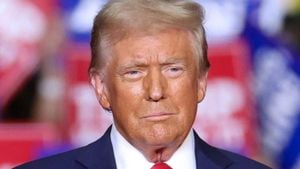China is making significant moves to bolster its financial market, with recent announcements indicating substantial reforms aimed at enhancing its capital markets. These changes are particularly focused on increasing integration with Hong Kong's financial environment, enhancing opportunities for both local and foreign investors.
At the heart of this initiative is Vice Premier He Lifeng, who has made it clear during the Global Financial Leaders' Investment Summit, hosted by the Hong Kong Monetary Authority (HKMA), of Beijing's commitment to support Hong Kong. He affirmed plans to facilitate the listing of more high-quality Chinese enterprises and expand the issuance of bonds within the city. This push is undoubtedly motivated by the need to restore Hong Kong’s reputation as a global financial hub, which has been under pressure amid geopolitical tensions and economic slowdowns.
"We will improve the mechanism for the regular issuance of treasury bonds, steadily increase issuance in Hong Kong and support Hong Kong in consolidat ing its position as a global financial business hub," He stated. His remarks signal Beijing's acknowledgment of the financial challenges faced by Hong Kong, including the recent declines in initial public offerings (IPOs) and secondary listings.
According to data compiled by Dealogic, 2024 has seen $9.1 billion worth of listings in Hong Kong, which, though showing some recovery from $5.88 billion in 2023, is significantly below the peak volume of $51.6 billion recorded in 2020. This slowdown has prompted job cuts among Western and Chinese financial firms, raising concerns over the capacity of these institutions to operate effectively within this declining market environment.
Compounding these issues, geopolitical uncertainties, particularly tied to the potential return of Donald Trump to the U.S. presidency and his stance on tariffs against Chinese goods, threaten to complicate the financial outlook. Trump's proposals to impose tariffs of at least 60 percent on Chinese imports could strain the already delicate diplomatic and business relationships between the U.S. and China. Fortunately, financial leaders at the summit remain cautiously optimistic, projecting growth opportunities within the Asian market, even as external factors potentially hamper Chinese prospects.
Despite these uncertainties, the Stock Connect scheme has emerged as a key facilitator of investment flows between mainland China and Hong Kong. Under this program, mainland investors are increasingly participating not just as spectators but as active players. For example, since Alibaba's dual-primary listing participated under the scheme, mainland investors have acquired around 4 percent of the company’s public float and contributed significantly (15 percent) to its trading volume.
Joe Tsai, co-founder and chairman of Alibaba Group, highlighted the benefits of this model during his address at the summit. He noted, "The main advantage of having a primary listing in Hong Kong is access to mainland investors through the Stock Connect programme. This brings significant liquidity to our stocks."", showcasing how the scheme not only strengthens Hong Kong's status as a major financial center but also connects it more deeply with the mainland's vast capital.
But this integration extends beyond just connecting markets; it also aims to solidify Hong Kong's role as the primary gateway for international capital seeking opportunities within China. The CSRC chairman, Wu Qing, noted the authority's commitment to pragmatic reforms intended to simplify market access and facilitate cross-border investments, which he discussed during the HKEX Connect Summit. The regulatory framework includes promises of easing restrictions, thereby nurturing greater participation from global investors.
Investors globally are keeping close tabs on these developments. With China's massive debt package of 10 trillion yuan announced earlier this month, alongside commitment to modernize and open up its market, confidence is tentatively returning. The proposed reforms indicate more than just economic recovery; they’re part of China's strategic vision to present itself as open and inviting to foreign participation, showcasing its readiness to adapt to international financial practices.
Hong Kong remains hopeful, especially as it continues to host international financial events like the recent summit, attended by some of the world's leading economic figures. This gathering emphasized opportunities for dialogue and engagement, marking Hong Kong as not just another locale for finance but as pivotal to Asian financial architecture.
Yet, hurdles remain. The region's future as a veritable financial epicenter will be determined not only by governmental policies but also by the ability of local firms to adapt quickly to these sweeping changes. The historical challenges of maintaining its status must be met with proactive measures from both government and businesses.
What remains to be seen is whether these ambitious reforms can draw back foreign corporations and investment managers who may have sought safer havens elsewhere due to the recent economic climate. The coming months will indicate whether this reform agenda leads to tangible recovery or if geopolitical issues push the market back toward uncertainty.
So, as China embarks on this next chapter of financial engagement with Hong Kong, investors and global markets will undoubtedly stay vigilant to the changes. The integration of finance between the mainland and Hong Kong may yet prove to revitalize the city’s role as the ‘superconnector’ to the world, but only time will tell how effectively these plans are implemented and their overall success.



